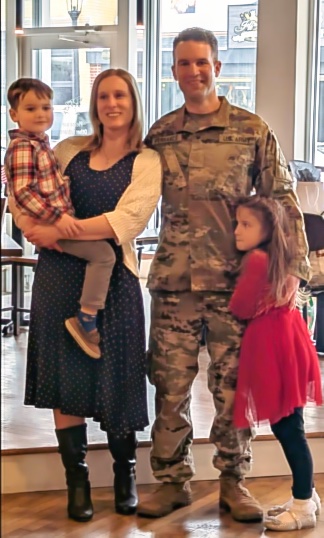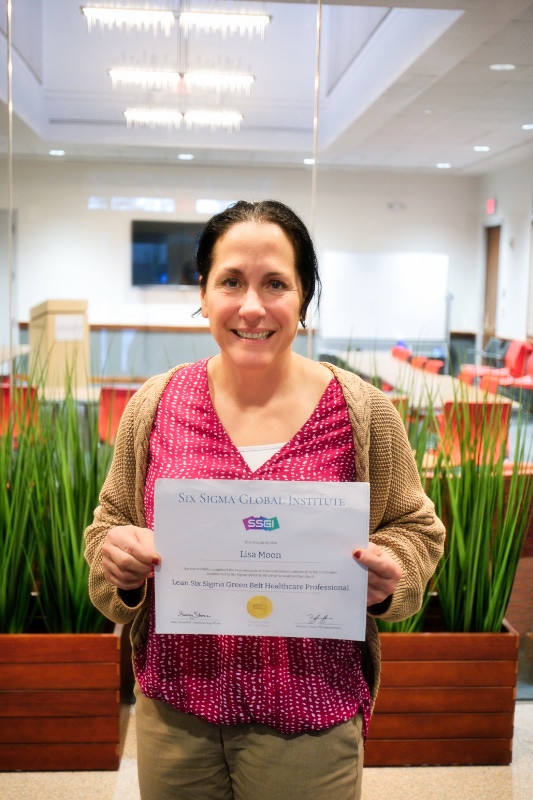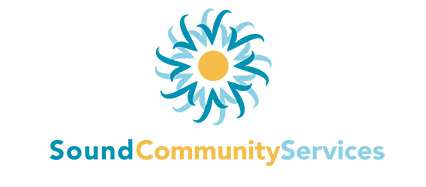“What Makes a Top Workplace in a Pandemic?
Caitlin M. Bagley
To Phil Steffens and his colleagues, working at Sound Community Services, Inc. (SCSI) is so much more than a job.
He’s been with the New London-based non-profit organization for 14 years, assisting with SCSI’s mission to educate, support and empower individuals with mental illness and substance abuse disorders. In his current position as program coordinator of Oasis, SCSI’s adult social club, Steffens develops creative ways to keep members engaged and provide support, outreach, and opportunities for community integration.

“Here, we aspire to create social change,” Steffens said. He and fellow staff members show up to work every day because what they do “is a life’s calling.”
As COVID-19 swept through the state and across the world, upending all manner of policies and procedures, Steffens and the rest of the team showed up big time. To this day, their work and camaraderie reinforce the agency’s reputation as a beacon of hope to a vulnerable population, and exemplify all the facets that make SCSI a two-time Hartford Courant Top Workplaces winner.
The Top Workplaces distinction — which SCSI first earned in 2019 — is based on employee responses to a confidential survey to measure satisfaction with their employer. This year, 89% of SCSI’s employees filled out the survey compared to 79% in 2019, despite disruption caused by the pandemic.
“It’s good to see that level of engagement at a time when workplace engagement is pretty bleak,” CEO Gino DeMaio said.
When employees are engaged, enthusiastic and committed to what they do, it translates to better results for clients. Each year, SCSI helps approximately 2,000 individuals across its programs, which include medication services, therapy, homeless support, residential services, social supports, intensive outpatient programs, and employment services. The majority of clients hail from New London, and the rest from surrounding towns like Norwich, Groton, Waterford, and East Lyme.
The staff has produced “extraordinary outcomes” in client engagement and satisfaction across all programs, DeMaio said. For example, employment services stand at nearly double the state standard, which dictate that at least 38% of an agency’s active caseload be in competitive employment. At SCSI, it’s closer to 70%, even now — staff members don their personal protective equipment (PPE) and do what it takes to help clients land and get to interviews and see them through the hiring process and beyond. So, what does it take for a small agency like SCSI — one that deals each day with the difficult realities of addiction and mental health — to not only persevere through an unprecedented global challenge, but even excel? In simpler terms: What does it take to become a Top Workplace in 2020?
The answer, at least at SCSI, lies in the core values that staff and leadership alike use to guide their work: compassion, accountability, respect, and excellence.
COMPASSION AND ACCOUNTABILITY IN A CRITICAL TIME OF NEED
For Tim Cormier, LPC, a clinician at SCSI, it helps to be employed by an organization that shares your personal values. “I love this agency even through difficult times,” Cormier said. “Our No. 1 goal is helping the people we serve.”
That goal became ever more critical as COVID-19 locked down the state. Cormier worried his clients would be put in harm’s way using public transportation to see him. SCSI had to come up with a plan to keep the staff and clients safe, quickly, to avoid a lapse in treatment and support for a vulnerable population.
Enter Marcia Beebe, RN, SCSI’s Director of Integrated Health. DeMaio calls her the agency’s very own “Dr. Fauci,” a nod to Dr. Anthony Fauci, who leads the National Institute of Allergy and Infectious Diseases and became a household name for his work on the national coronavirus task force. A long-time nurse, Beebe has a background in infectious disease and is familiar with Fauci’s leadership under previous public health crises. She could tell early on that COVID-19 was going to pose a serious threat, and sounded the alarm at SCSI.
“There was remarkable instant recognition from leadership that this was going to be long term,” Beebe said. “They never said ‘no.’ They asked, ‘How?’” And so Beebe led the agency’s COVID-19 task force, working with staff, IT, and leadership to develop protocols to operate all programs as safely as possible. This meant transitioning clinicians to working from home and seeing clients through phone calls and virtual visits, instituting COVID-19 testing policies at residential programs, and implementing stringent social distancing, PPE, and sanitizing guidelines to carry out on-site medication services — all in a matter of days.”
“The speed and efficiency of the transition was especially crucial for therapy services. The Centers for Disease Control and Prevention reported a considerable increase in symptoms of anxiety and depressive disorders in the U.S. from April to June, at the height of isolating stay-at-home orders and scary news headlines.
“Having the ability to talk to someone, process emotions and fear of the unknown — it’s a lifeline,” said Cassie Rice, LSCW, SCSI’s Director of Outpatient Services, who oversees clinicians and therapy programs.
In fact, SCSI saw a drastic increase in people showing up to their virtual or dial-in therapy appointments during the height of pandemic, Rice said.
Cormier can attest to this – he’s been busier than ever. “We’re able to reach people who would have otherwise had poor show rates” due to lockdowns and the impact on public transportation, Cormier said. With SCSI’s telehealth services, he has instead been strengthening relationships with his clients at a time when they may need his help the most.
Though the transition to telehealth was smooth, the work itself did not get easier. Video and dial-in therapy requires clinicians to be even more engaged, their listening skills more enhanced, than during a typical in-person session, Rice explained. Her team of clinicians has had to “step it up to stay motivated,” Rice said. “It’s tough work. This is tough stuff.” Jason Hyatt, Chief Program Officer, emphasized the significance of that tough work.
“People are making choices when they may be unsafe and don’t have sound judgment. We need to make sure they are supported and feel connected.” That’s why at SCSI, clients and staff alike are encouraged to speak up, be heard, and feel validated without judgment, Hyatt said. “Otherwise, people will be scared and fearful. We really try to give a sense of normalcy, some peace.”
A SHOW OF RESPECT AMONG CLIENTS, COLLEAGUES, AND LEADERSHIP
Transparency among leadership, staff, and clients is one of Joey DiGiovanna’s takeaways from his work with SCSI, especially in the last eight months or so. “We don’t have all the answers, but we’ll do this together,” has been a resounding theme at SCSI, DiGiovanna said. As program coordinator for SCSI’s Young Adult Services (YAS), he works with younger clientele. Keeping them engaged in the recovery process on a typical day can be difficult, let alone during a pandemic. By emphasizing that everyone — from all walks of life — is facing the unknown together, DiGiovanna, his team, and leaders level the playing field with clients and as colleagues. Despite the challenges posed by these uncertain times, SCSI has continued to deliver the programs clients relied on like YAS Fridays, weekly community outings for YAS clients. With proper COVID-19 safety protocols in place, DiGiovanna and his team have been able to continue this program, providing a fun distraction for clients to look forward to. Continuation of programs like YAS Fridays is made possible by support and encouragement from leadership, DiGiovanna said. Steffens — the aforementioned program coordinator for Oasis, SCSI’s adult social club — agreed. At SCSI, there’s no “stay in your lane” mentality. Staff members are encouraged to be creative. No idea is off limits, as long as it ties in with the ultimate goal of serving clients. “Creativity enables us to maximize our potential as employees, so there is no restriction on what we can come up with to help our clients,” Steffens said.
Steffens has had to do a lot of creative thinking to reach out and serve Oasis members after in-person meetings at the clubhouse were paused. As a program designed to decrease social isolation, social distancing posed an existential threat.
So, he asked Oasis members to express their feelings through art, collected their work via mail and put it together as the book “Positive Tales,” a visual testament to coping with isolation and anxiety in an uncertain time.
Steffens also took time during lockdown to renovate the clubhouse so members had a fresh space to return to. Passersby may have seen him outside, hard at work sprucing up the place. Just as creativity is encouraged, valued, and respected at SCSI, so is pushing beyond your comfort level. Rice — described earlier as the director of outpatient services — is newly minted in her position. She started as an intern in SCSI’s clinic in 2014. At the start of the pandemic, Rice was working as a program coordinator when her supervisor Lisa Moon, a captain in the U.S. Army Reserve, was deployed to support medical sites in New York City. Within days, Rice was promoted to associate director and led the team of clinicians for two months until Moon’s return, overseeing the transition to telehealth as COVID-19 protocols were established.”
““Cassie was in a sink or swim position, and she rose to the occasion,” Moon said. “We’re very proud.” Rice added that she did have the full support of the executive team, but she was empowered to pave her own way through the transition.
“We’re supported in our trials, triumphs and errors,” she explained. “We’re allowed to make mistakes, and that’s how you learn and make things better.” Upon Moon’s return, both women were elevated to their current positions: Rice to Director of Outpatient Services, and Moon to Senior Director of Clinical Services.
EXCELLENCE: A TOP WORKPLACE WITH A PROFOUND IMPACT
It’s clear the folks at SCSI are committed to their work and are supported from the top down. The final piece of the puzzles lies in how this tight-knit team working across departments and specialities impacts the lives of those they serve.
It goes beyond the agency-wide collaboration for strategic planning, where everyone is invited to have a say. It even goes beyond the numbers, like the benchmark-crushing 70% employment services rate, or the increase in attendance for therapy appointments.
To CEO Gino DeMaio, it’s the story of how Supportive Housing Program staff helped a woman living in a tent in the woods for nearly two years find a warm home. It’s the time he visited the grocery store and ran into a former client, who told him SCSI employees saved her life from a downward spiral when they helped her land a job.
To Stacey Supplicki, a case manager with the Supervised Apartment Program (SAP), SCSI’s largest housing site, it’s seeing people as more than just a diagnosis. It’s seeing that they can achieve the goals they set for themselves, like recovery, when they have a support system in place. SCSI is “where you find yourself and develop the skills to become part of the community,” she said. Supplicki helps residents stay engaged, hopeful, and focused on their recovery by designing activities that can be tailored to skills and interests to motivate them. One such activity was a contest to come up with a tagline for SAP. One client’s entry: “Stepping stones for success.”
To Errol Maurice, Senior Director of Community & Residential Services, it’s seeing his team (which includes Steffens, DiGiovanna and Supplicki) be part of something “that’s bigger than them.”
To Rebequa Vazquez, a mother of four who works as a medical assistant in the clinic while pursuing her nursing degree on the side, it’s the feeling you get when you come home from a day of work knowing you did something good. She helps the nurses on staff with administrative work, keeping records in order, and scheduling injections and psychiatric evaluations. Vazquez also does a lot of outreach to connect with clients, acting as “the heart and eyes and ears of the agency,” according to Beebe, her supervisor.
Though arranging childcare, school dropoff, and a commute would make anyone grow weary (pandemic or otherwise), Vazquez is in the office every weekday, ready to lend a hand.
“That’s why I come into work every day. To make a difference.”
Inspired by the work of the Sound Community Services staff? Visit us at soundcommunityservices.org to make a donation.”











